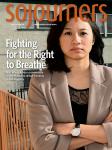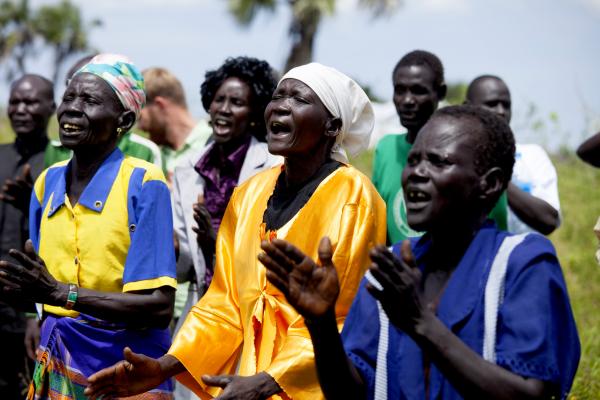SOUTH SUDAN is the world’s youngest and most fragile state. The outbreak of civil war in 2013 pushed millions out of the country and into refugee camps. Oil revenues fuel President Salva Kiir’s regime, notorious for kidnapping and torturing those who criticize him.
Kiir’s suppression hasn’t stopped courageous Christian women from taking their prayers for peace to the streets. On the first Saturday of every month, hundreds of women gather to demand an end to war.
“All 64 tribes are represented in the women’s division of the South Sudan Council of Churches,” said Maria Bol (not her real name), a member of the ecumenical body responsible for organizing the marches. “The challenge in South Sudan is that the government has no tear gas. They just use live bullets against peaceful protesters. But our actions often go on uninterrupted, since they know we are peaceful and prayerful.”
Although the international media portrays South Sudan’s women and youth as passive victims of their tragic circumstances, it is exactly these demographics that are pushing back against this brutal regime. In November, youth members of more than 40 women’s organizations convened the largest anti-war demonstration since the war began. Thousands turned up, wielding messages of peace while Kiir’s national security forces—responsible for intimidating and abusing his critics—attempted to single out leaders.
These leaders continue to suffer—some even being intimidated in the neighboring countries to which they fled—and threats continue against their family members back home.
“This militancy is born of Sudanese rule, of our former colonial masters,” said Juba-based conflict resolution analyst Fareed Musa Fataki. “There is a school of thought that powerful men are not subjected to any rules. Thus, South Sudan has no clear distinction between politics and militarism.”
The recent normalization of militarism—guns wielded by those in civilian attire, kidnappings of peace activists beyond South Sudan’s borders, road checkpoints throughout the supposedly secure capital city of Juba, rampant disappearances, and use of secret detention sites—may be the reason why many South Sudanese choose peaceful over violent resistance.
South Sudan is a nation born into peace. Broad nonviolent campaigns (including those prompted by the 2002 South Sudan Council of Churches document “Let My People Choose”) led to a national referendum across the 10 original states that birthed a new nation into existence, with about 99 percent voting for self-determination.
The people of South Sudan have never tolerated their descent into war. Since the first shots were fired, Christian women have marched and preached against violence in marketplaces and police stations. Artists have flooded the streets with symbols of peace. Children in peace clubs have shouted songs against bloodshed. Peacemaking trainings have undermined the efforts of politicians to recruit and arm youth. Activists have carried dead bodies to parliament. The South Sudanese have been anything but passive.
The South Sudan Council of Churches’ 2017 action plan for peace invites people of Christian faith across the globe to join their advocacy for a comprehensive peace agreement. “We call upon the church in the United States to join us in nonviolent advocacy to stop the war,” said Bol.
Yet the ecumenical thrust for peace in South Sudan isn’t idly waiting for international solidarity. Christians standing up to militarism have chosen the path of Jesus—speaking truth to power despite the risks. In the words of one female youth activist, “Nonviolence is the way we choose to live. We all have power. Nonviolence is the choice to use it.”

Got something to say about what you're reading? We value your feedback!

